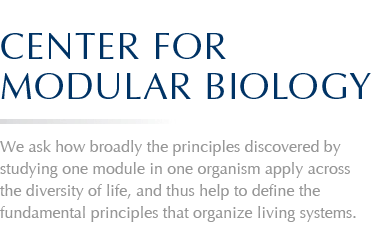|
The Center for Modular Biology, based in the FAS Center for Systems Biology, is a multi-disciplinary, multi-investigator research program. In addition, the center is an experiment in the organization of biological research, with the aim of building a truly collaborative group of scientists with a single guiding vision, and nucleating a larger community dedicated to looking for principles that explain biology. The center is one of the National Centers for Systems Biology funded by NIGMS.The center’s principal investigator is Andrew Murray. In our first 5 year grant period we asked how well the idea of "functional modules" [1] — each module comprising a set of molecules that, together, do a job needed for survival and reproduction — helps us to understand the organization, behavior and evolution of cells and organisms. We will now ask how the existence of these building blocks restrains or enhances the generation of diversity. Like modularity, diversity is a fundamental property of biological systems that manifests itself at all levels of organization from molecules in a cell, through genetic diversity in a population, to species diversity in ecosystems. Our work will search for the organizing principles that underlie the generation and effects of diversity across the full range of scales of time and space. The center’s research program comprises fifteen interacting projects, led by Bauer Fellows, and by faculty at Harvard and elsewhere. In these projects we will exploit advances in microscopy, cell biology, and genomics to study how diversity is generated, exploited and controlled over a range of organisms, levels of complexity, and time scales: from the evolution of diversity in organisms to stochastic variability in single cells. In particular, we are interested in the following problems: 1) Generating diversity: We will define the rate at which organisms generate diversity. We will determine the distribution of beneficial and deleterious mutations and assess the role of specialized forms of mutation. We will determine the lower limits that stochastic variation sets on the accuracy of regulatory circuits. 2) Controlling diversity: We will study how organisms control the effect of noise. The numbers of copies of any molecule in a cell fluctuates stochastically and cells must deal with errors that produce damaged molecules. We will investigate how evolution and engineering can minimize the effects of noise in processes as diverse as protein folding, gene expression, and circadian clocks. 3) Responding to environmental diversity: Organisms must optimize their response to temporally and spatially variable environments. We will investigate the ability of existing pathways to detect fluctuating environments and examine how organisms evolve responses to fluctuating environments. 4) Exploiting diversity: We will investigate how selection acts on diversity to produce new phenotypes. We will ask how selection on genetic diversity produces a range of biological phenomena, including altered patterns of gene expression, alterations in the host range and social behavior of pathogens, new species, and stable community structures in ecosystems. Our outreach, education and training efforts include:
1. Hartwell, L. H., Hopfield, J. J., Leibler, S. & Murray, A. W. From molecular to modular cell biology. Nature 402, C47-C52 (1999). [Download PDF]
|

